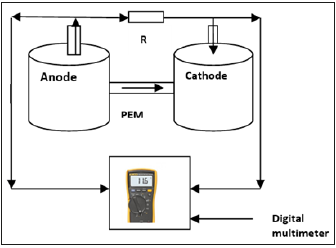Bioremediation of Agro-Wastewater of Poultry in a Microbial Fuel Cell by Livinus A Obasi* in Journal of Biotechnology & Bioresearch_ Journal of Biotechnology

Abstract
The
study shows the possibility of degrading pollution physico-chemical parameters
present in agro wastewater (poultry) in a microbial fuel cell with microorganisms
operating in an anaerobic condition. Three similar cells designed and operated
with different Proton Exchange Membranes (PEM) makeups: clay-based (CBP) whose
strength and stability were modified with sodium alginate (C6NaH7O6) n and
subjected to varying degrees of temperatures ranging from 200 °C to 600 °C and
applied in (MFC-1, MFC-2 and MFC-3. The cells were operated for 20 days at
influent BOD and COD of 493mg/l and 2052mg/l respectively. The study showed a
reduction in the turbidity, pH, Total Dissolved Solid (TDS), Total Suspended
Solid (TSS) and salinity of the wastewater.
After twenty days of operation, the BOD removal efficiencies of the three
reactors were 72%, 82% and 84% respectively, whereas the COD removal
efficiencies were 38%, 57% and 60% respectively. The study also shows that the
MFC-3 at 6000C PEM preparation condition gave the optimum performance giving
the lowest values of the various wastewater pollution parameters. This clearly
suggests that within the conditions of the experimentation process, clay
performs optimally in proton transfer from the anode chamber to the cathode
chamber of a microbial fuel cell at higher temperatures due to increase in
cation exchange capacity
https://crimsonpublishers.com/jbb/fulltext/JBB.000534.php
Crimson
Publishers: https://crimsonpublishers.com/
For
more articles in Journal of
Biotechnology,
Please
click on below link: https://crimsonpublishers.com/jbb/



No comments:
Post a Comment